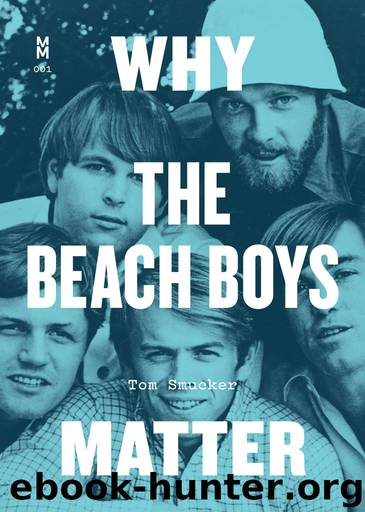Why the Beach Boys Matter by Tom Smucker

Author:Tom Smucker [Smucker, Tom]
Language: eng
Format: epub
Publisher: University of Texas Press
Published: 2018-03-14T16:00:00+00:00
10
Hip and White
There’s all kinds of hip, but it’s always about knowing at least two different, almost opposite realities at the same time. Elitists who don’t know how the non-elites think aren’t hip, they’re just snobs. Inhabitants of the non-elite who only know their own world can be for real, but they’re not hip. Cool kids who know how the non-cool kids think have a hip that might be as shallow as knowing what color socks the cool kids will be wearing to school the next day. That’s close to the adolescent hip, where teenagers understand a separate reality as well as their parents’ reality, a hip that disappears as they age.
Then there’s a hip about a deeper knowledge, a reality that squares don’t perceive. In a musical subculture like bebop or punk, there have to be the squares on the outside for there to be a hip inside. There have to be standards on which beboppers improvise their changes. There have to be rock excesses for punk rockers to be reacting against before there can be punk. There have to be parents who don’t understand it for there to be rock and roll. And below it all lies the foundational, real American hip, the negotiation of what W. E. B. Du Bois named double-consciousness, the necessity of the oppressed to understand the way the oppressor sees them as well as how they see themselves.
Whether cool kids at school or globe-hopping rock stars, in their own way, the early Beach Boys were hip. Mike Love sang about it in “I Get Around.” Most important, they came out of Southern California, and at that moment, SoCal was the mass culture’s cutting edge. In their memoirs, both Mike Love of the Beach Boys and Dean Torrence of Jan and Dean recall being swept up at the beginning of their careers into the new national fascination with California. That made them hip. And they knew it.
We will never know how or whether Jan and Dean would have adjusted to mid-1960s changes, but the Beach Boys had to show they were aware of those changes if they were going to continue to exist inside pop culture. They had represented so much that now, they had to either figure out how to represent the present, or they would only represent the past. The Four Seasons weren’t swimming in this symbolic pool. They continued to have hits. They were from New Jersey, but at the time the world wasn’t interested in their New Jersey; the Seasons weren’t interested in the rest of the world, and they didn’t project themselves as conscious representations of New Jersey anyway.
The assassination of JFK, the end of the civil rights era, and the Vietnam War all raised questions about what was really true and what was false, about whether there was any shared consensus that everyone was working from, about whether presidents were lying and believed something different than what they were saying. How far you took all this depended on who you were, where you were from, and how you made sense of your life.
Download
This site does not store any files on its server. We only index and link to content provided by other sites. Please contact the content providers to delete copyright contents if any and email us, we'll remove relevant links or contents immediately.
| Classical | Country & Folk |
| Heavy Metal | Jazz |
| Pop | Punk |
| Rap & Hip-Hop | Rhythm & Blues |
| Rock |
Cecilia; Or, Memoirs of an Heiress — Volume 2 by Fanny Burney(31939)
Cecilia; Or, Memoirs of an Heiress — Volume 3 by Fanny Burney(31928)
Fanny Burney by Claire Harman(26592)
We're Going to Need More Wine by Gabrielle Union(19032)
Plagued by Fire by Paul Hendrickson(17402)
All the Missing Girls by Megan Miranda(15936)
Cat's cradle by Kurt Vonnegut(15328)
Bombshells: Glamour Girls of a Lifetime by Sullivan Steve(14046)
For the Love of Europe by Rick Steves(13885)
Leonardo da Vinci by Walter Isaacson(13315)
4 3 2 1: A Novel by Paul Auster(12368)
The remains of the day by Kazuo Ishiguro(8968)
Adultolescence by Gabbie Hanna(8915)
Note to Self by Connor Franta(7663)
Diary of a Player by Brad Paisley(7557)
Giovanni's Room by James Baldwin(7320)
What Does This Button Do? by Bruce Dickinson(6194)
Ego Is the Enemy by Ryan Holiday(5412)
Born a Crime by Trevor Noah(5371)
